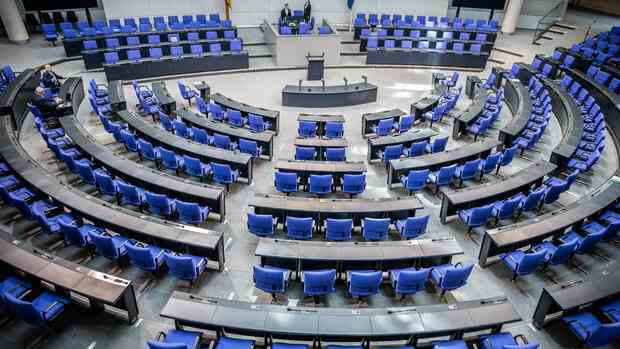It is not self-evident that politics restricts itself, as it is now doing with the electoral reform.
(Photo: dpa)
How excited everyone wasn’t about the ever-growing Bundestag. There was talk of an “XXL Parliament”, of a “Bläh-Parliament”, which due to the arithmetic of the German electoral law would soon be larger than that of China.
Politicians have been putting off the issue for years, and even the use of an authority like Wolfgang Schäuble hasn’t changed anything. The fact that the traffic light coalition now seriously wants to downsize the Bundestag and has decided on a reform in the Bundestag is therefore initially commendable.
It is not self-evident that politics restricts itself. And it was always clear that an electoral law reform would lead to trouble.
But that doesn’t change the fact that the traffic light reform was a complete failure. The electoral reform is undemocratic, constitutionally problematic and poisonous for the country’s political culture.
The electoral reform of the traffic light suffers in two places. In order to make the Bundestag smaller, the second vote should be given more weight. In the future, therefore, not every directly elected member of parliament will sit in the Bundestag.
CSU suspects an attack on their existence
This inevitably resolves a sense of uneasiness among many citizens. Anyone who ticks their direct candidate also expects someone from their constituency to move into the Bundestag. Anyone who undermines this basic principle creates a problem with democracy.
The second problem: The traffic light wants to abolish the basic mandate clause. This stipulates that a party that fails at the five percent hurdle still moves into the Bundestag if it wins at least three direct mandates.
If this clause is abolished, not only the left but also the CSU are threatened with being thrown out of the Bundestag if their result in Bavaria falls below five percent nationwide. The CSU therefore sees the reform as an attempt on its existence.
In the Federal Republic it is well-established practice for the government and the opposition to find common ground on issues that shake up fundamental democratic principles. The traffic light has now abandoned this principle.
This not only threatens a lawsuit battle before the Federal Constitutional Court. Ironically, the traffic light government is also poisoning the political culture in the country. Instead of getting rid of the competition through electoral law reform, it should rather face it in political competition.
Ampel and of course Union should have pulled themselves together and opted for another option: an enlargement of the constituencies.
Of course, this variant would have tempted parties to bitter fights and to shape the layout in their favor. But it would still have been a better option than the current reform.
More: Traffic light coalition votes for electoral law reform
